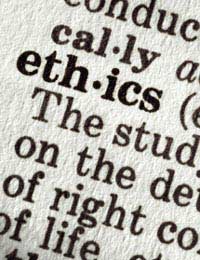What Role Do Ethics Play in Business?

You can split business ethics into three parts. The first is the way a company deals with its customers. The second is the manner in which a company relates to its business partners. The third concerns the standards a company expects its staff to follow.
The companies with the best reputation in all three areas have an ethical code. This makes a series of points similar to these:
- All company staff must treat everyone with respect
- No one on the company must at any time give information that misleads
- All staff must know and abide by the company’s business guidelines
- All staff must understand and comply with the law
Why Have an Ethical Code?
In a competitive business, though, an ethical code begs two questions: why do we need such a code, and don’t we risk damaging our profits by having one?These questions come from the belief held by many that business is war. Some business people admit that unethical behaviour can be very profitable. Their attitude is simple: it’s a dog eat dog world.
The problem is covering up unethical behaviour. Customers, business partners and staff prefer honesty even if unethical behaviour boosts profits. If a business engages in something untoward and it comes to light, many feel aggrieved and ashamed.
A cover-up, however, creates a cycle of deception. Some businesses get away with this. Others crash spectacularly.
Effective Business
A lot of business gurus now argue that having an ethical code creates better business practices. These practices lead to three major business benefits: higher sales, fewer legal issues and better staff retention.Generally speaking, consumers are happy to buy the products and services of a company they know is ethical. When they do so, consumers feel good about the product or service. This applies even when they know they could buy something similar for a lower price.
An ethical company is also likely to face fewer legal challenges. This stands to reason if part of a company’s ethical code is to make sure all staff know and follow the law.
Finally, many staff prefer to work in a company with high ethical standards. They know the company treats everyone with respect. Which means they receive a fair deal over pay and conditions.
Introducing an Ethical Code
Any business that wants to be ethical must have a suitable code. But this is just the start. Everyone in a company must be sincere about ethical behaviour - and managers must lead the way.A company must also explain its ethical code to staff, business partners and customers, and keep on doing so. It’s not enough to point out that an ethical code exists within a company. All those associated with a company, including its customers, must understand its ethical views.
This is why the companies that have such codes make their ethical views known in adverts and on packaging. Cynics might say that such companies are using ethics as a sales tool, and in a way this is true. But how else can companies get their message across?
Key Role
Ethics can therefore play a key role in business. As an entrepreneur, you must decide whether you wish to embrace an ethical code. If you do, your business can benefit significantly.- How Diversification Can Save a Business
- Why UK Entrepreneurs Increasingly Sell to Foreign Markets
- Common Hazards That Can Ruin a Business
- The Business Benefits of Social Media
- Submitting Tenders for Work
- How to Improve Repeat Business
- Using Foreign Manufacturers
- Business Mistakes to Avoid
- The Pros and Cons of Outsourcing
- How Webmail Can Help Your Business
- How to Negotiate Successfully
- Balance Your Work and Lifestyle
- Keep the Ideas Coming
- Set High Standards
- Develop an Action Plan for Growth
- Are Entrepreneurs Really Suited to Running a Business?
- Tips on Dealing with Recession
- Stay Aware of Regulations
- The Basics of Business Law
- Knowing When to Delegate
- Look After Your Staff
- Decide Whether You Need Staff or Contractors
- Develop Green Policies
- Make Technology Work for You


Re: What is Entrepreneurs' Relief?
In my opinion I have been badly advised by my accountants --I sold my half of a bed and breakfast business in 2008(MAY) and was…
Re: What Government Grants Can You Get?
I have been running my own unique hair and beauty business successfully for 7 years. I would like now to expand and add…
Re: What Government Grants Can You Get?
i would like to start up my business but i cannot secure any grants. can anyone help. i need £20 thousand to purchase…
Re: What Government Grants Can You Get?
I'm thinking of setting up my own Security Company and going as a sole trader is there a grant or any help that i can get…
Re: What Government Grants Can You Get?
I am starting a new company, we have developed a rapid prototype with all of our fund's. we now need to apply for a…
Re: What Government Grants Can You Get?
I am a serious and passionate social entrepreneur and am looking to develop a support service across Chelmsford. I am…
Re: What Government Grants Can You Get?
Our business needs a new van can we get a grant, if we had 2 vans we could take on new staff
Re: What Government Grants Can You Get?
Is there a grant to help a new business upgrade their premises. I have a new yard with a unit that has a basic office.…
Re: What Government Grants Can You Get?
I am just going self employed as a builder, can I get a grant to buy tools to set myself up?
Re: What Government Grants Can You Get?
I am in the process of setting up my own business and have heard about a possible grant of £1,500.00 being available.…